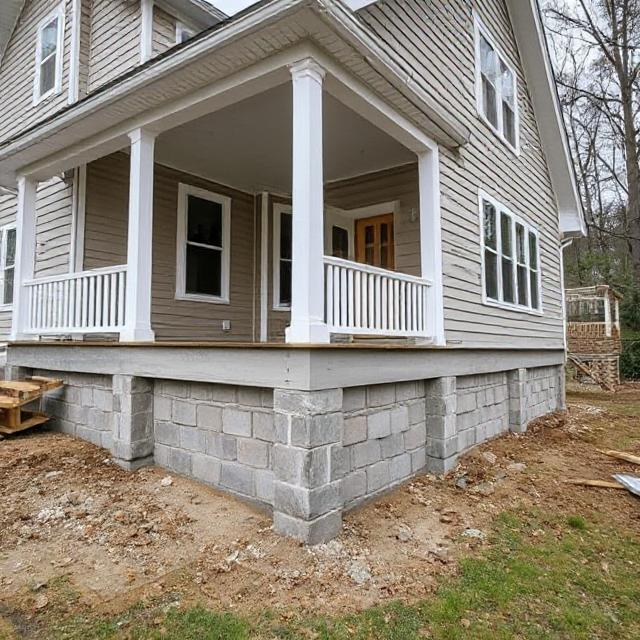
How Much Does It Cost To Raise A House For Flooding In Asheville?
Introduction
Asheville, North Carolina, a picturesque city known for its vibrant arts scene and stunning mountain vistas, faces unique challenges concerning natural disasters, particularly flooding. Homeowners often find themselves grappling with the potential foundation lifting techniques damage that flooding can inflict on their properties. One viable solution to mitigate flood risk is house lifting—a process that raises homes to a safer elevation. Understanding the financial implications of house lifting for flood protection is crucial for homeowners in Asheville looking to safeguard their investments and ensure long-term safety.
In this article, we will dive deep into the financial aspects of house lifting, exploring costs, benefits, insurance considerations, and more. By the end of this read, you’ll have a comprehensive understanding of what it takes to lift your home and how to navigate the financial landscape effectively.
Understanding the Financials of House Lifting for Flood Protection in Asheville
House lifting involves raising a structure above designated flood levels to reduce vulnerability during high-water events. This process requires careful planning and investment but can ultimately save homeowners significant amounts in repair costs, insurance premiums, and emotional distress.
The Importance of House Lifting in Flood-Prone Areas
Why Should You Consider House Lifting?
Flooding can result in severe structural damage that may not only threaten your home’s integrity but also diminish its value significantly. Investing in house lifting can be seen as a proactive measure—protecting your family and your property from future disasters.
Benefits Beyond Financial Savings
While addressing the direct financial implications is essential, it's also important to consider intangible benefits like peace of mind. Knowing your home is protected from floods allows you to focus on enjoying life rather than worrying about potential disasters.
Cost Breakdown: What Does House Lifting Entail?
Initial Consultation: A Necessary Step
Before any work begins, homeowners should schedule an initial consultation with house lifting contractors near me. During this meeting, contractors will assess your property’s current elevation and discuss options tailored to your needs.
- Home Inspection Costs: $200 - $500
- Engineering Assessments: $500 - $2,000
- Permitting Fees: Varies by local regulations ($100 - $1,000)
Construction Costs: What to Expect
The bulk of your expenses will come from actual construction. Here’s a rough estimate of what you might encounter:
- House Lifting Services: $10,000 - $40,000 depending on size and complexity.
- Foundation Work: If new foundations or pilings are required—additional costs may range from $5,000 - $20,000.
- Utilities Reconnection: Gas lines or electrical systems may need adjustments—budget around $1,000 - $3,000.
Financing Options for House Lifting
How Can You Finance Your Project?
Considering the significant investment involved in house lifting can be daunting. However, several financing options are available:
Insurance Impacts After House Lifting
Will My Homeowners Insurance Change?
After investing in house lifting for flood protection:
- Expect changes in premiums based on your new elevation.
- Some homeowners receive discounts after elevating their homes due to reduced risk factors.
Real-Life Examples from Asheville Residents
Success Stories
Several residents in Asheville have successfully lifted their homes:
- A family lifted their 1950s bungalow by 4 feet at a cost of approximately $30,000 and now enjoys lower insurance rates while feeling secure against floods.
Potential Drawbacks to Consider
Are There Any Risks Involved?
While house lifting offers numerous advantages:
- The process can disrupt daily life during construction.
- There may be unforeseen costs if structural issues arise during lifting.
Local Regulations Affecting House Lifting
What Permits Do You Need?
Before starting any project:
DIY vs Professional Help
Is It Worth Going Solo?
While motivated homeowners might consider DIY methods:
- Engaging professional contractors ensures safety and adherence to regulations.
For reliable results:
- Look for "house lifting contractors near me" to find experts familiar with local codes.
Environmental Considerations
How Does House Lifting Affect Surrounding Areas?
House lifting doesn't just protect individual homes; it contributes positively toward community resilience against flooding and environmental degradation.
FAQs About House Lifting
1. What is house lifting?
House lifting involves raising a home above flood levels using specialized equipment and techniques to reduce vulnerability during floods.
2. How much does it cost?
Costs vary widely based on home size and location but typically range from $10,000 to $40,000 or more.
3. Will my insurance premium decrease?
Yes! Many homeowners see reduced premiums after elevating their homes due to decreased risk factors associated with flooding.
4. Can I finance my house-lifting project?
Absolutely! Home equity loans and personal loans are common ways to finance such projects.
5. What permits do I need?
You'll need various permits depending on local regulations; always check with municipal authorities before proceeding.
6. Are there risks involved?
Every project has risks including potential structural issues that could arise during lifting; working with professionals minimizes these risks.
Conclusion
Understanding the financial aspects of house lifting for flood protection in Asheville is vital not just for protecting one’s investment but also ensuring peace of mind in an unpredictable climate landscape. While initial costs might seem daunting at first glance—investing in professional services often pays off by safeguarding your property against future disaster-related expenses while providing lasting security for years ahead.
If you're considering elevating your home as a preventive measure against flooding—do not hesitate! Reach out today to reputable house lifting contractors near me who can guide you through every step of this crucial process!
This article has explored various dimensions related to the financial implications surrounding house-lifting projects tailored specifically for residents living in Asheville experiencing flooding concerns while emphasizing actionable insights that empower readers towards making informed decisions concerning their homes' safety measures against natural calamities such as floods!
